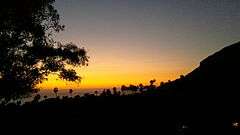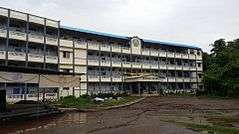Uran
| Uran उरण | |
|---|---|
| Town | |
 Uran | |
| Coordinates: 18°53′N 72°57′E / 18.89°N 72.95°ECoordinates: 18°53′N 72°57′E / 18.89°N 72.95°E | |
| Country |
|
| State | Maharashtra |
| District | Raigad |
| Elevation | 21 m (69 ft) |
| Population (2011)[1] | |
| • Total | 30,439 |
| Demonym(s) | Urankar (उरणकर) |
| Languages | |
| • Official | Marathi |
| Time zone | IST (UTC+5:30) |
| PIN | 400702 |
| Telephone code | 022 |
| Vehicle registration | MH-46 and MH-43 |
.jpg)
Uran is part of Navi Mumbai city on the western coast of India. It lies in the Raigad district, east of Mumbai across the Dharamtar Creek. Uran is primarily a fishing & agriculture village, which has developed into the special economic zone of Uran. The primary language spoken is Agri& KOLI which is a dialect of Marathi.
History
The city name derived from the Hindu goddess Uranavati. It was called Uruvan during the rule of Madhavrao I, the fourth Peshwa of the Maratha Empire. Later, the area was named Uran by the Portuguese and Ooran by the British.[2]
Many Indian dynasties have ruled the area. In early history, these included the Maurya Empire, Sātavāhana Empire, Western Kshatrapas, Vākāṭaka Empire, Chalukyas, and Yadavas.[2][3][4]
The area around Mumbai was under Portuguese and British rule in the 16th to 19th centuries.[2]
Uran was subject to the Maratha princely states in the Maharashtra. Uran was once the base of the famous Maratha Sarkhel (Admiral) Kanhoji Angre,[5] who battled European naval interests in the 18th century.
Geography
Uran is located at 18°53′N 72°56′E / 18.88°N 72.94°E.[6] Uran has an average elevation of 21 metres (69 ft).
On the tip of a peninsula, Uran district is surrounded by sea on three sides. The town of Uran itself is centrally located on the peninsula, flanked by Karanja village to the south and Mora village and port to the north. Among the other villages in the Uran district are Ambikawadi, Aveda, Bajarpur, Bandhilwadi,Bhendkhal,Bandhpada, Bokadvira, Bori,URAN KOLIWADA, Chanaje, Chirner, Dastaan, Dighode, Dhakti Jui, Dongree, Funde, Jasai, Jaskhar, Karanja, Kathe Ali, Karal, Kegaon, Khopte, Koproli, Kundegav, Mora, Mothi Jui,Mulekhand, Nagaon, Nagoan (Mandal Ali),Navghar, Panaje, Pagote, Pirkon, Sarde, Savarkhar, Sheva, Sonari, Vasheni, Vindhane, Vinayak, Ekatghar and Ranjanpada.
Uran has very beautiful landscapes and surroundings. The outskirts of town are largely rural, remaining among the few undeveloped areas within the Navi Mumbai city limits. Local roads are lined by greenery, rice fields in the monsoon season, and mountains.
Uran is home to extensive salt pans, part of a long-standing network of salt manufacturing around Mumbai.[7] The land has been under redevelopment pressure.[8]
The Uran wetlands were once home to many species of birds and reptiles, some critically endangered. The wetlands were developed in 2009 and 2010.[9]


Economy


The main occupation in Uran is fishing. 80% of the fish production of Mumbai comes from fishermen based out of the Uran district, especially the villages of Karanja and Mora.
The second major occupation is farming. Uran contributes to the production of rice in the Raigad district. Raigad is the second largest district in terms of rice production in India.
Shipping, shipbuilding, and port support are major economic factors in Uran district. Jawaharlal Nehru Port (JNPT) is the largest container terminal in India.[10] Other container terminals in the Uran district include APM Terminals (formerly GTI) and DP World (formerly the British Peninsular and Oriental Steam Navigation Company). Salt pan owners revolted against the government decision to build a sea port, but the port has proved to be the main source of income to residents and nearby villages, as major projects and warehouses have opened nearby.
The Indian Navy maintains a naval base near Mora. Locals claim that the base has stifled the growth of the town, due to sea travel restrictions imposed by the Navy for security.
The Oil and Natural Gas Corporation (ONGC) has a plant nearby. GTPS-MSEB is Asia's first power plant run by natural gas.
Other industrial and manufacturing employers Grindwell Norton Limited,[11] NAD, and the Skols Brewery (closed in 2005[12]).
Demographics
Uran is growing. In the 2001 India census, Uran had a population of 23,254;[13] this had increased by the 2011 census to 30,439.[1] Males constitute 53% of the population and females 47%. In Uran, 10-11% of the population is 6 years of age or younger.[1][13]
Uran's average literacy rate is also rising, from 79% in 2001 to 82% in 2011.[1][13] Males lead females in literacy: male literacy was 83% in 2001 and 85% in 2011, and female literacy was 75% in 2001 and 79% in 2011.[1][13] India's national literacy average is 59.5%.
Culture
Places of worship

Uran has many Hindu temples, some of which host annual festivals. Some of the well known temples are:
- Shanteshwari Aai Temple, Navin Sheva Uran:Shanteshwari Aai Temple is Very famous in Uran Taluka.It is in Navin Sheva village.
Its palkhi is famous in Raigad District.
- Bahiridev Temple, Sarde Uran:' Shree Bahiridev(Ughad) is Gramdaiwat of all Sarde Village. It is Jagrut Devasthan and it is based on Creek of Sarde which is one of branch of Patalganga Creek.
- Radhakrishna Temple, Sarde, Uran: Which is based at Radhakrisha ali(Sarde Village hill)A Grand Festival is celebrated on the occasion of Shree Krishna Jayanti. There are Huge celebration's in Palakhi occasion.
- URAN-KOLIWADA IS HINDU TEMPLE SHREE BAPUJIDEV MINDIR & JARI - MARI MINDIR.
- Ratneshwari Temple, Jaskhar,Ratneshwari temple is one of the most Famous & Jagrut Devasthan in Uran city.
- Girobadev Temple,Khopta located in East of Karanja & Khopta creek


- Mankeshwar Temple Uran: One of famous temples in Uran, located right next to Mankeshwar beach, Kegoan. Dedicated to Lord Shiva, annual festival celebrated here in the month of November.
- Vinayak Temple Kegoan, Uran: located in Kegoan. Dedicated to Lord Ganesha, Very old and beautiful temple constructed by Peshwas (recently refurbished). A small Hanuman Temple is directly opposite to the Ganesha Temple. A well and a pond adds to the scenery. History of this temple dates back to 1365 according to sources.[14]
- Dargah of Hazrath Mukim Shah baba,Uran: Located in Uran it is one of the most famous dargah of uran.It is also an Major tourist attraction in Uran.Devotees from nearby areas visits this dargah on large scale.
- Uran Jama Masjid:Located in Masjid Mohalla area of Uran.It is the biggest mosque in uran.
- Dargah of Hazrat Moinuddin Qadri:Located on uran-karanja road.
- Masjid-e-Muhammadia: Located near Rajpal Naka
Other attractions

Another major tourist attraction in Uran is Pirwadi Beach, which is frequented by tourists from nearby areas like Panvel, Navi Mumbai, and Mumbai. A distant view of South Mumbai is visible from there.
Ransai Dam is a destination in Uran. It is located near Dighode Village.
An old military fort named Dronagiri is located just beside the ONGC plant on the top of the Dronagiri mountain. This was a Maratha fort for a short period before passing into possession of the Portuguese, according to the locals. Entry has banned for security reasons.
Education
There are many schools which provide primary education and secondary education, but very few graduate colleges are present. There are currently no engineering colleges or medical colleges in Uran.
The schools in Uran are:
- Global International Pre-school,Chirner
- Global International Pre-school ,Sonari
- Tukaram Hari Vajekar Higher Secondary School, Funde
- N.I. High School - Bazarpeth
- St. Mary's High School Uran - Uran
- English Medium School - operated by the Uran Education Society in Bori
- Anmol English Medium School - Bokadvira
- Rotary English Medium School - Bori
- IES Jawaharlal Nehru Vidyalaya - JNPT Township
- JNPT St. Mary's High School - JNPT Township
- Dronagiri High School - Karanja
- Citizen Urdu medium primary school - Masjid mohalla
- Citizen Urdu medium secondary school - Koliwada
- Iqra english medium school - Bakshi Mohalla
- [Kendriya Vidyalaya] - NAD
- Bhagubai Changu Thakur - Vidyalaya
The colleges are:
- Veer Wajekar A.S.C College - Funde
- Konkan Dnyanpeeth Sanstha (Dagdi College) - Uran
- Uran Education Society College - Uran
- Citizens college - koliwada
- Panchratna Adhyapak Vidhyalaya - Pirkon
- CarePoint Hospital and Institute of Paramedical Studies
The Industrial Training Institute (ITI) at Daaurnagar provides several courses for career paths such as electricians and fitters.
There are also various madrasas in city for islamic education.
See also
References
- 1 2 3 4 5 "Maharastra: Raigarh: Uran: Uran: Uran TOWN". Census of India. Ministry of Home Affairs, Government of India. 2011. Retrieved 12 March 2015.
- 1 2 3 "History of Uran". JourneyMart.com.
- ↑ Greater Bombay District Gazetteer. Maharashtra State Gazetteers. 27. Gazetteer Department (Government of Maharashtra. 1960. pp. 127–150).
- ↑ Dwivedi, Sharada; Mehrotra, Rahul (2001). Bombay: The Cities Within. Eminence Designs. p. 79. ISBN 81-85028-80-X.
- ↑ Weekend Breaks from Mumbai. Outlook Traveller Getaways. 2003. p. 413.
- ↑ "Uran, India Page". Falling Rain Genomics, Inc. 27 February 2015.
- ↑ "KONKAN SALT PANS: Wilful distortion denies salt pan owners justice". India Together. Oorvani Media Pvt. Ltd. 3 April 2008.
- ↑ Manecksha, Freny (April 2010). "Saltpan city". Infochange News & Features.
- ↑ "The MAP News". Mangrove Action Project (236 ed.). Mangrove Action Project. 30 April 2010.
- ↑ "The biggest ports of India". Rediff Business. Rediff.com. 8 October 2010. Retrieved 29 July 2013.
- ↑ "About Us". Grindwell Norton Ltd. 2007. Retrieved 12 March 2015.
- ↑ "SABMiller shuts Skol Uran unit". Business Standard. Mumbai: Business Standard Ltd. 31 October 2005.
- 1 2 3 4 "Census of India 2001: Data from the 2001 Census, including cities, villages and towns (Provisional)". Census Commission of India. Archived from the original on 2004-06-16. Retrieved 2008-11-01.
- ↑ "Devotees still throng the 600-yr-old Uran temple for Maghi Ganeshotsav". TOI. Navi Mumbai: TOI Group. 11 February 2016.